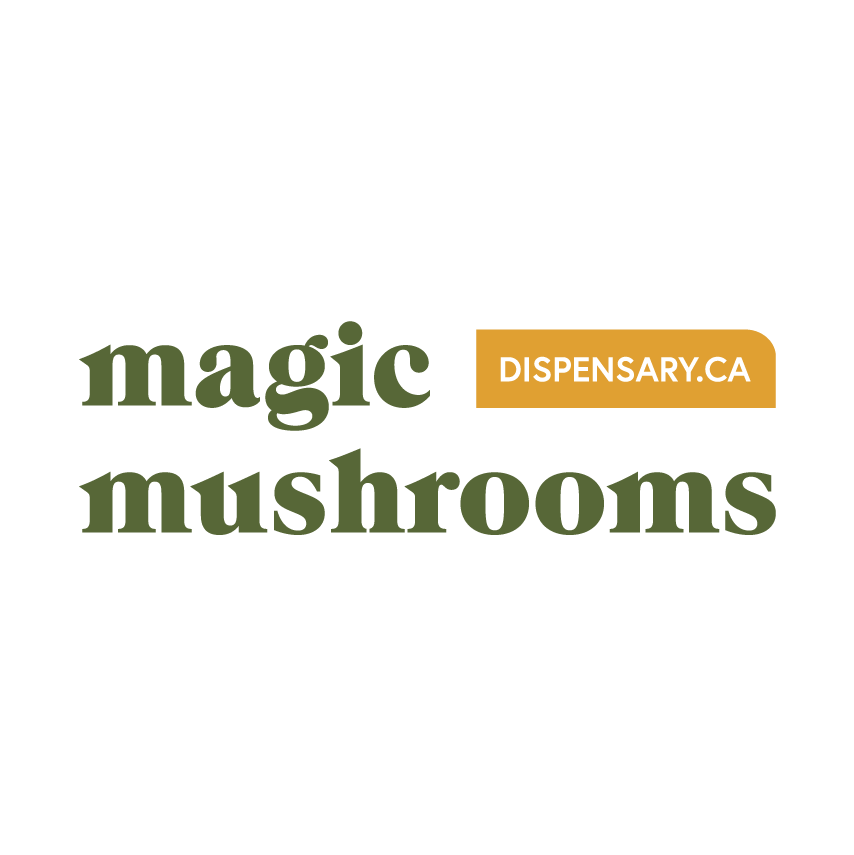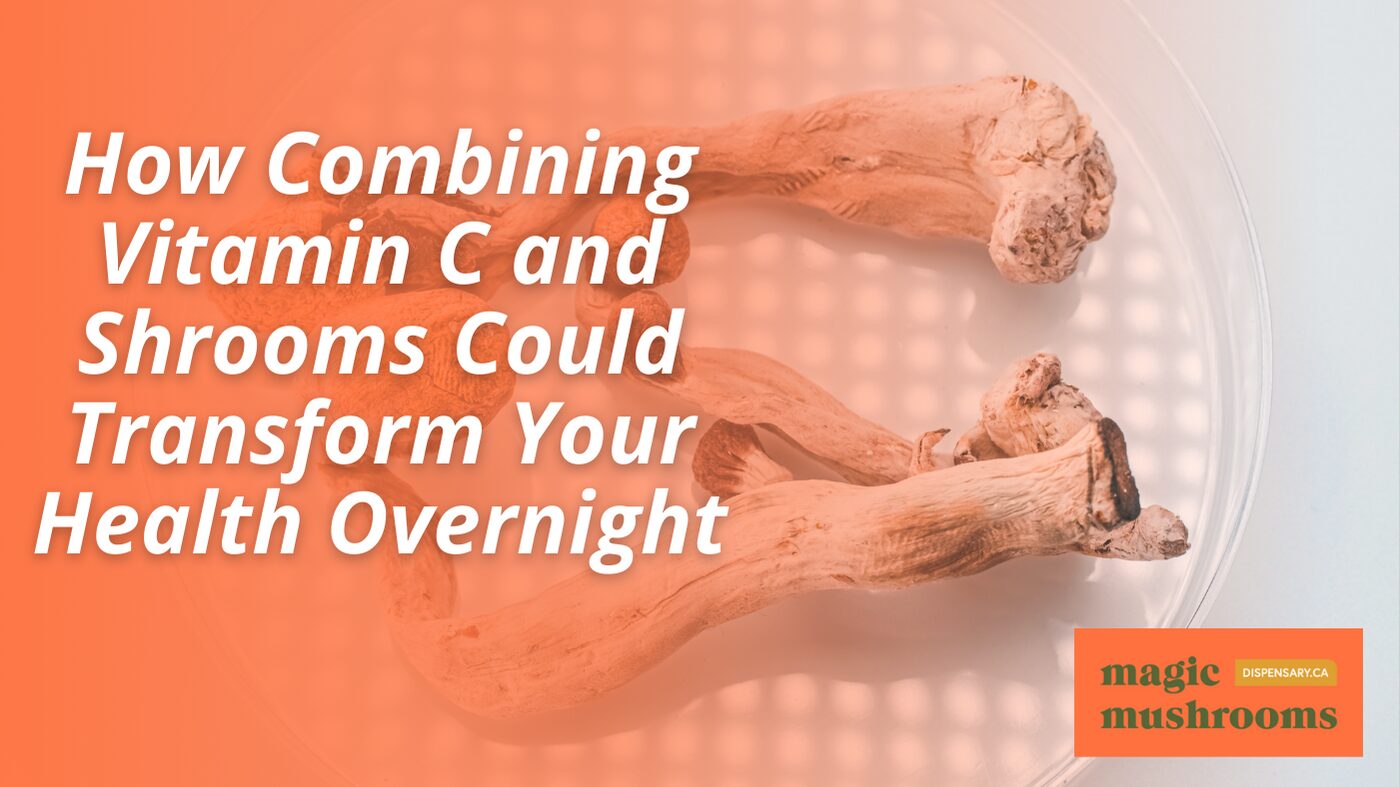Mixing Vitamin C, a crucial antioxidant, with mushrooms that are high in psilocybin can significantly improve your health. Vitamin C is known for enhancing your immune system and facilitating the production of collagen, whereas psilocybin carries a wide array of mental health advantages, such as improved cognition and emotional stability. Consuming them together might boost the bioavailability and effectiveness of psilocybin, leading to enhanced health outcomes like better energy and stress reduction. While the rapid change sounds fascinating, thorough exploration is necessary to understand its full effects.
Key Takeaways
- Combining Vitamin C and shrooms can enhance antioxidant and immunostimulant properties, boosting overall health.
- The mix potentially amplifies the bioavailability of compounds in mushrooms, assisting in psilocybin absorption and effect.
- Vitamin C might mitigate the side effects of psilocybin, leading to cognitive enhancement and emotional balance.
- The combination aids in cell repair and promotes sleep and relaxation, improving health overnight.
- It’s vital to monitor progress and consult healthcare professionals, as there can be potential side effects.
Understanding the Basics: Vitamin C and Shrooms
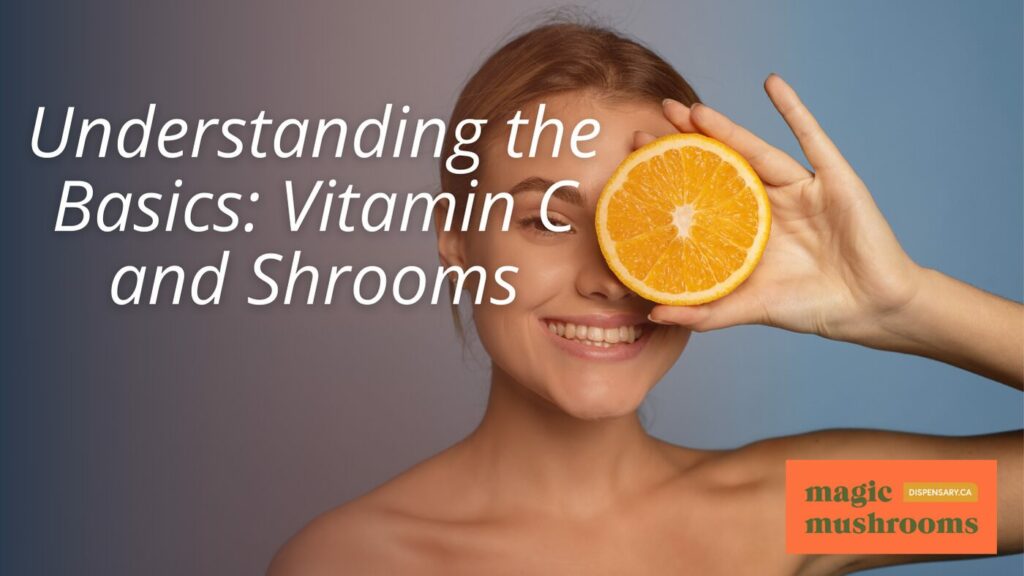
To thoroughly comprehend the potential health benefits of combining Vitamin C and shrooms, one must first understand these components’ fundamental properties and effects. Vitamin C, ascorbic acid, is an essential nutrient crucial in numerous biological functions. It is a potent antioxidant that helps protect the body against oxidative stress, supports the immune system, and aids in collagen production, among other things.
Shrooms, specifically magic mushrooms or psilocybin mushrooms, contain a naturally occurring psychoactive compound called psilocybin. This compound has been associated with various potential health benefits, including alleviating symptoms of depression and anxiety, promoting mental clarity, and enhancing creativity and focus. As a result, the combination of vitamin C and mushrooms, also referred to as vitamin C shrooms or vitamin C with mushrooms, has been gaining popularity as a natural health supplement.
The magic mushrooms vitamin C combination is believed to enhance the effects of both components, providing a synergistic benefit. Although the mechanisms behind this synergy are not fully understood, some suggest that vitamin C could potentially enhance the absorption of psilocybin, thereby intensifying its effects. Alternatively, the antioxidant properties of vitamin C may help counteract any potential oxidative stress caused by psilocybin, thereby promoting overall wellbeing.
The Power of Vitamin C
Shifting our focus to the individual properties of Vitamin C, it’s essential to recognize its significant role in the human body. Vitamin C, also known as ascorbic acid, is a water-soluble vitamin that plays a crucial role in maintaining the health of the body’s connective tissue and acting as an antioxidant.
Our bodies can’t produce Vitamin C, so we must get it from dietary sources like citrus fruits, bell peppers, strawberries, and spinach. Unlike most mammals, humans lack the specific enzyme required for producing Vitamin C, making it an essential part of our diet.
One of the primary roles of Vitamin C is to help produce collagen, a protein needed to develop and maintain healthy teeth, bones, blood vessels, and skin. It’s also known for its antioxidant properties, protecting our cells from free radical damage. Free radicals are unstable molecules that can harm cellular structures, leading to chronic diseases.
Vitamin C also enhances our immune system by stimulating the production and function of white blood cells, which are essential for fighting infections and illnesses. Additionally, it aids in absorbing iron, a mineral necessary for the growth and repair of all body tissues.
Furthermore, studies have shown that Vitamin C may help reduce the risk of chronic diseases, including heart disease, and it may also aid in preventing gout, an inflammatory arthritis.
Unveiling Medicinal Mushrooms
Exploring the domain of medicinal mushrooms reveals that these fungi hold many health benefits, much like Vitamin C. Often overlooked, mushrooms are a rich source of antioxidants, vitamins, and minerals. Many types, such as Reishi, Cordyceps, and Lion’s Mane, have been used in traditional medicine for centuries, and modern science is starting to validate their therapeutic potential.
Reishi, often called the ‘mushroom of immortality,’ is known for its immune-boosting properties. Studies show it can help regulate the immune system, fight inflammation, and even combat certain types of cancer. On the other hand, Cordyceps, often dubbed as ‘Himalayan gold,’ is renowned for its energy-boosting and lung-supporting properties. It is frequently used by athletes to enhance performance and by those living at high altitudes to combat the effects of thin air.
Lion’s Mane, a shroom that resembles a cascading white waterfall, has unique neuroprotective properties. Research indicates it can stimulate the production of nerve growth factor, potentially slowing the progression of neurodegenerative diseases like Alzheimer’s and Parkinson’s.
The Science Behind Vitamin C and Shrooms
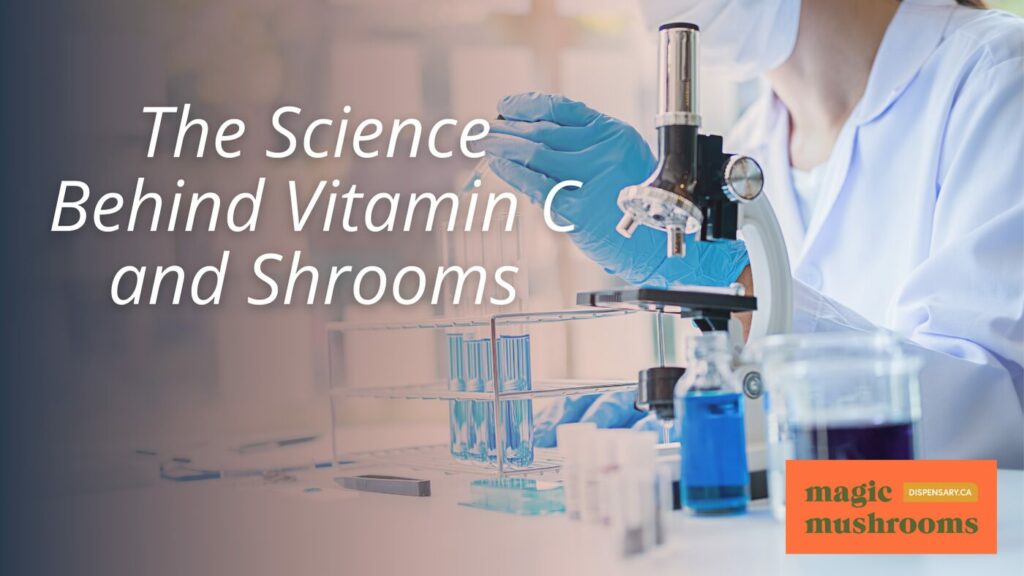
Drawing a parallel between the health benefits of medicinal mushrooms and Vitamin C, it becomes evident that these two natural substances can synergize for overall wellbeing. The science behind this concept lies in their individual properties and how they can complement each other when combined.
Vitamin C, also known as ascorbic acid, is a potent antioxidant. It contributes to immune defense by supporting various cellular functions of the immune system. It can enhance immune cells’ function, help produce collagen for wound healing, and regenerate other antioxidants within the body.
On the other hand, medicinal mushrooms contain various compounds, such as polysaccharides, terpenoids, and phenolic compounds, that have been found to possess antioxidant, anti-inflammatory, and immunomodulatory effects. These compounds can stimulate the immune response, reduce inflammation, and protect body cells from oxidative stress.
Combining Vitamin C and medicinal mushrooms can result in a potent blend that boosts the body’s defenses in a complementary manner. Vitamin C’s antioxidant properties can work in tandem with the antioxidant effects of the compounds in mushrooms, making for a more effective defense against free radicals and oxidative stress. Their immune-boosting properties complement each other, potentially enhancing the body’s ability to fend off diseases.
Benefits of Vitamin C With Shrooms
Harnessing the power of Vitamin C and medicinal mushrooms can yield numerous health benefits, thanks to their collaborative antioxidant and immunostimulant properties. Together, these two powerful nutrients synergize to optimize health and wellbeing.
Vitamin C, renowned for its immune-boosting properties, is a potent antioxidant that helps protect the body against harmful free radicals. Its role in collagen synthesis makes it essential for skin health, wound healing, and bone and tooth maintenance. On the other hand, medicinal mushrooms, often referred to as ‘shrooms,’ offer a wealth of nutrients, including vitamins, minerals, and antioxidants. They contain beta-glucans, which have been shown to stimulate the immune system, promoting better defense against pathogens and diseases.
When Vitamin C and shrooms are combined, their benefits are amplified. Vitamin C enhances antioxidant capacities, offering excellent protection against oxidative damage leading to chronic diseases such as heart disease and cancer. Shrooms’ immunostimulant effects are also amplified by Vitamin C, resulting in a more robust immune response.
Moreover, the combination of Vitamin C and shrooms may have unique benefits. Some research suggests that Vitamin C can increase the bioavailability of certain compounds in shrooms, meaning the body can absorb and utilize these nutrients more effectively. This could enhance the overall health benefits of this powerful duo.
Health Advantages of Vitamin C and Magic Mushrooms
Combining Vitamin C and psilocybin-containing ‘magic’ mushrooms outside traditional medicinal mushrooms presents distinct health advantages. Renowned for their health benefits, they may offer a synergistic effect that boosts overall health more than when consumed separately.
Vitamin C is a significant antioxidant that helps strengthen the body’s natural defenses, protect cells from harmful molecules like free radicals, and enhance the immune system’s functionality. It is also essential for producing collagen, a protein for healthy skin, bones, tendons, ligaments, and blood vessels.
On the other hand, psilocybin, the active compound in magic mushrooms, has attracted interest from the medical community for its potential therapeutic properties. Research suggests it could be beneficial in treating mental health disorders, such as depression and post-traumatic stress disorder (PTSD), by promoting emotional openness and providing relief from symptoms. Additionally, it may improve neural connectivity, hence boosting cognitive function.
Combining Vitamin C and magic mushrooms can improve physical and mental health. Vitamin C’s immune-boosting and antioxidant properties, coupled with psilocybin’s potential mental health benefits, create a holistic health approach.
However, it’s important to note that while the health benefits are promising, further research is needed to fully understand the synergistic effects of Vitamin C and magic mushrooms. It’s also necessary to consult with a healthcare professional before starting any new health regimen, especially involving substances like psilocybin, which is classified as a Schedule I drug in many jurisdictions.
The Unique Combination: Vitamin C and Shrooms
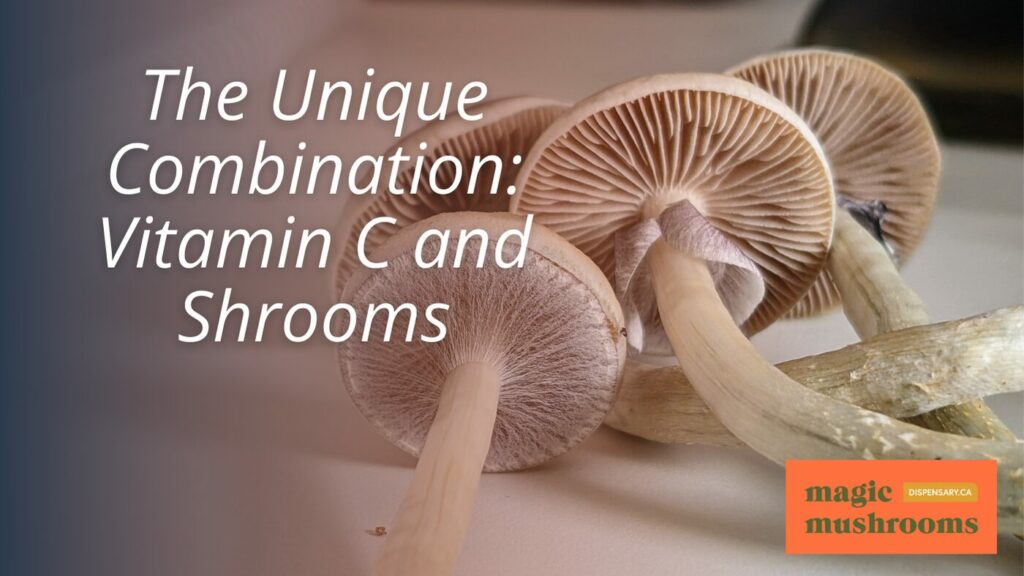
Building on the benefits of Vitamin C and magic mushrooms, the unique combination of these elements presents a novel approach to holistic health. Although unconventional, this blend is believed to augment the properties of both components, potentially leading to amplified health benefits.
Vitamin C, a potent antioxidant, combats harmful free radicals in the body, while magic mushrooms, specifically psilocybin mushrooms, have psychoactive properties known to influence mood and perception. When combined, the antioxidant effects of Vitamin C are thought to enhance the psychedelic experience provided by psilocybin, leading to increased mental clarity and emotional wellbeing.
This combination isn’t just based on speculation. Preliminary research indicates that Vitamin C may help to potentiate the effects of psilocybin, making the experience more profound and beneficial. It’s believed that Vitamin C aids in the conversion of psilocybin to psilocin, the active ingredient responsible for the psychedelic effects, thereby intensifying the overall experience.
Concurrent use of these substances may also offer physiological benefits. Vitamin C’s antioxidant properties can help mitigate some of the oxidative stress that may occur during a psychedelic experience, promoting overall physiological wellbeing.
However, while this combination shows promise, more extensive research is required to understand the potential benefits and risks fully. Therefore, the combination of Vitamin C and shrooms should be approached with caution, under professional guidance, and within the boundaries of the law.
Decoding the Overnight Transformation
Often, individuals who combine Vitamin C with psilocybin mushrooms report experiencing a significant transformation seemingly overnight. This transformative experience is usually described as a drastic enhancement in mental clarity, a heightened sense of awareness, and a profound emotional balance. Such rapid changes may seem mystifying, but a closer examination of the science behind this unique combination helps decode this overnight transformation.
Vitamin C, a potent antioxidant, aids in the absorption of psilocybin, the active compound in psychedelic mushrooms. This accelerates the onset of psilocybin’s effects, usually characterized by altered perception, a sense of interconnectedness, and reflective thoughts. When consumed together, the body metabolizes these substances more efficiently, leading to a faster and more powerful impact.
Moreover, Vitamin C, known for its neuroprotective properties, may mitigate potential side effects of psilocybin, including anxiety and fear. This could explain the heightened sense of calm and emotional balance individuals report.
The profound mental clarity and heightened awareness often observed may be attributed to psilocybin’s influence on brain connectivity. Research indicates that psilocybin increases communication between different brain regions, promoting broader, more flexible thinking. Combined with Vitamin C’s antioxidant and neuroprotective effects, this can lead to a profound cognitive transformation.
Understanding this overnight transformation requires acknowledging the synergistic effects of Vitamin C and psilocybin. While further research is necessary to substantiate these claims fully, preliminary evidence underpins the potential of this combination as a powerful tool for cognitive enhancement and emotional balance. This understanding also provides a foundation for exploring other potential health benefits.
Immunity Boosting Properties
In addition to cognitive enhancement, the combination of Vitamin C and psilocybin mushrooms exhibits potential immune-boosting properties. Vitamin C, a well-known antioxidant, plays a pivotal role in the immune system. It enhances the production of white blood cells, vital for fighting off infections. Additionally, Vitamin C improves the function of these cells, making them more effective at eliminating harmful pathogens.
Psilocybin mushrooms, on the other hand, have been shown to possess anti-inflammatory properties. Chronic inflammation has been linked to numerous health conditions, including heart disease and cancer. By reducing systemic inflammation, psilocybin mushrooms could enhance the body’s immune response.
When combined, these two may work synergistically to boost the immune system. Vitamin C could enhance the anti-inflammatory effects of psilocybin mushrooms, creating a more robust immune response. This could reduce the risk of various inflammation-related health conditions and poor immune function.
However, more research is needed to understand this combination’s potential immune-boosting properties fully. While initial studies are promising, controlled clinical trials are necessary to validate these effects. Individuals considering this combination should also consult a healthcare professional to ensure it is safe and appropriate for their unique health needs.
Energy Enhancement Power

Beyond the potential immune-boosting attributes, combining Vitamin C and psilocybin mushrooms may offer energy-enhancing benefits. The symbiosis of these two substances can contribute to elevated vitality, stamina, and overall energy levels. This is primarily attributed to their individual properties, which, when combined, foster an environment conducive to enhanced energy production.
Vitamin C, a potent antioxidant, plays a significant role in the synthesis of carnitine, a compound that aids in the conversion of fats into energy. This process is critical for maintaining the body’s energy balance. On the other hand, psilocybin mushrooms have been shown to stimulate the production of serotonin, a neurotransmitter often referred to as the ‘feel good’ hormone. Increased serotonin levels can result in heightened mood and energy levels, providing a natural boost without the crash associated with caffeine or sugar.
Scientific studies indicate that Vitamin C consumption increases the bioavailability of psilocybin, allowing for more efficient absorption and utilization of this compound by the body. This synergistic effect may enhance the energy-boosting benefits of both substances.
However, while this combination may enhance energy, usage should be done responsibly and under appropriate supervision. Potential side effects, interactions, and contraindications need to be carefully considered. Additionally, acknowledging the importance of a balanced diet and regular exercise with supplementation can help maintain optimal energy levels.
Mental Clarity Benefits
Exploring the benefits of mental clarity, the synergistic interaction of Vitamin C and psilocybin mushrooms reveals promising potential for cognitive enhancement and mental wellbeing. Vitamin C, a potent antioxidant, protects the brain against oxidative stress, which can mitigate cognitive decline. Psilocybin, the active compound in ‘shrooms,’ has been studied for its potential to stimulate new neural connections, thereby improving cognition.
The concurrent intake of both substances may offer an essential effect. Vitamin C could potentiate the effects of psilocybin, enabling the brain to process information more efficiently, increasing focus, and promoting mental clarity. This combination may also promote neuroplasticity, the brain’s ability to adapt and form new neural connections, a critical factor in learning and memory.
The mental clarity gained from this combination could have significant implications for mental health. Psilocybin has been investigated for its potential in treating mental health conditions like depression and anxiety, with promising results. By enhancing the effects of psilocybin, Vitamin C may further support cognitive health, promoting a sense of calm and clarity.
Clinical trials are still needed to understand and validate these benefits fully. However, anecdotal evidence and preliminary studies suggest that combining Vitamin C and psilocybin mushrooms could foster enhanced cognitive function and improve mental well-being. As research progresses, this combination is hoped to offer a natural, effective strategy for promoting mental clarity and overall cognitive health.
Skin Health Improvements
Shifting the focus to skin health, combining Vitamin C and psilocybin mushrooms may pave the way for remarkable improvements in dermatological wellbeing. Vitamin C, a potent antioxidant, is pivotal in maintaining skin health. It aids in collagen synthesis, a protein that gives skin elasticity and strength. Additionally, it mitigates the impact of harmful free radicals and reduces signs of aging, like wrinkles and age spots.
Psilocybin, on the other hand, is a naturally occurring psychedelic compound found in certain types of mushrooms. Studies suggest it may have anti-inflammatory properties, which could benefit conditions like acne, psoriasis, and eczema characterized by inflammation and skin irritation.
When used in combination, Vitamin C and psilocybin could potentially amplify each other’s benefits, resulting in healthier skin. Vitamin C could enhance the body’s absorption of psilocybin, while the latter could boost the effectiveness of Vitamin C’s antioxidant properties.
It is important to note that while these potential benefits are promising, more research is needed to fully understand the mechanisms behind the synergistic effects of Vitamin C and psilocybin. Always consult with a healthcare professional before starting any new supplement routine.
Digestive System Support
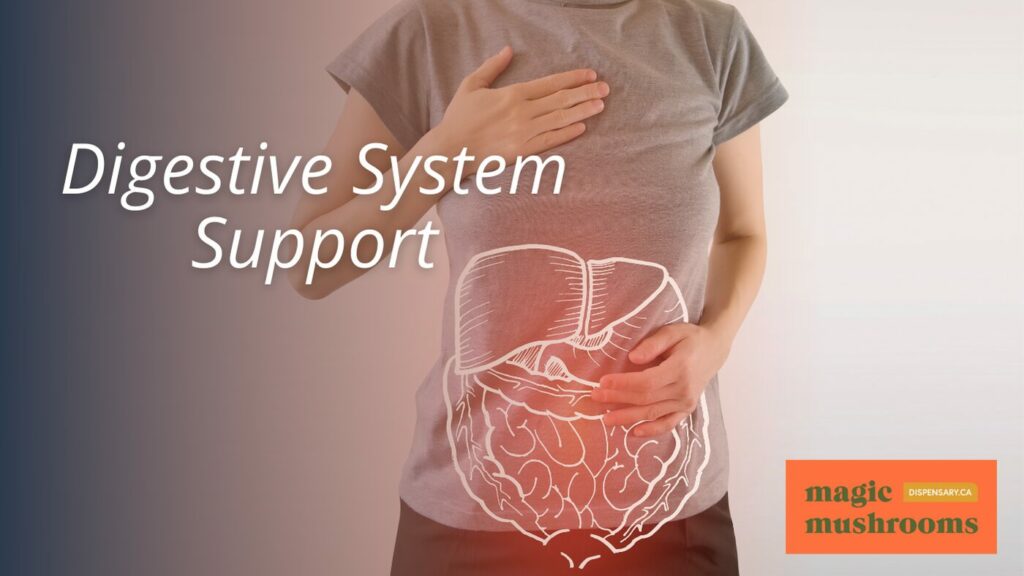
In the domain of digestive health, the integration of Vitamin C and psilocybin mushrooms may offer significant support to our gastrointestinal system. Vitamin C, a potent antioxidant, can aid in the digestion of proteins and fats, fostering a healthier gut environment. It also contributes to the efficient absorption of iron, a mineral essential for maintaining the health of our intestinal lining.
Psilocybin mushrooms, on the other hand, are known for their prebiotic properties. They aid in growing beneficial gut bacteria, improving digestion, enhancing nutrient absorption, and bolstering our overall gut health. This symbiosis between Vitamin C and psilocybin mushrooms could lead to a more balanced, robust digestive system.
Research indicates that a balanced gut microbiome is pivotal in our body’s immune response. The combination of Vitamin C and psilocybin mushrooms could help strengthen this connection. Vitamin C can enhance our body’s production of white blood cells, the soldiers of our immune system. Meanwhile, a healthy gut microbiome, supported by psilocybin mushrooms, can better regulate our immune responses.
However, it is essential to note that the benefits of Vitamin C and psilocybin mushrooms extend beyond the digestive system. They impact various bodily functions, improving our health in multiple dimensions. While this article focuses on the digestive benefits, one should pay attention to the holistic health benefits this combination could provide.
Myth-Busting Vitamin C Misconceptions
Despite widespread knowledge and acceptance of Vitamin C’s health benefits, numerous misconceptions must be addressed. The most common of these fallacies is the belief that consuming high doses of Vitamin C can prevent the common cold. While Vitamin C does strengthen the immune system, it does not make one impervious to viruses such as the common cold. Studies have shown that it may reduce the duration and severity of cold symptoms, but it is not a guaranteed preventive measure.
Another widespread misunderstanding is that all sources of Vitamin C are equivalent. While oranges are most often associated with Vitamin C, many other fruits and vegetables contain higher amounts, such as strawberries, kiwi, and bell peppers. Furthermore, the body optimally absorbs Vitamin C when it’s sourced from a variety of foods.
Lastly, a significant misconception is that Vitamin C only benefits immune function. This potent antioxidant plays a crucial role in several bodily functions. It aids in producing collagen, a protein essential for skin, hair, nails, and joint health. It also assists in the absorption of iron and the healing of wounds.
Debunking Shrooms Health Myths
Just as with Vitamin C, numerous misconceptions surrounding the health benefits of mushrooms, or ‘shrooms,’ need to be dispelled. The first and most common is that all types of mushrooms benefit health. While it’s true that many species have proven nutritional and medicinal value, not all mushrooms are created equal. Some are inedible, while others are downright toxic.
Another myth is that mushrooms are a complete source of protein, like meat or dairy products. While mushrooms contain some essential amino acids, they should not be relied upon as a primary protein source. They contain less protein than animal-based foods and even some legumes.
Another misconception is that eating mushrooms can lead to significant weight loss. While they are low in calories and can be part of a balanced diet, no scientific evidence supports the idea that mushrooms alone can cause weight loss.
There’s also a prevalent myth that mushrooms can cure cancer. Some varieties like Reishi, Shiitake, and Maitake have been studied for their potential cancer-fighting properties, but the research is in the initial stages. It is inappropriate and misleading to present mushrooms as a definitive cancer cure.
Lastly, the claim that mushrooms boost the immune system is partially valid. While some varieties are rich in beta-glucans that can stimulate immune function, it’s not a one-size-fits-all solution. Individual responses to these compounds can vary.
Safety Measures and Precautions

Following specific safety measures and precautions is essential when incorporating mushrooms into your diet for their potential health benefits. The first and foremost safety measure is to ensure that the mushrooms you consume are safe and non-toxic. Many varieties of wild mushrooms can be poisonous and harmful to health. Always purchase your mushrooms from reliable sources or grow them under controlled conditions.
Furthermore, it’s vital to prepare mushrooms properly before consumption. They should be thoroughly cleaned and cooked to avoid contamination with bacteria or parasites. Raw mushrooms contain a compound called agaritine, which may have carcinogenic properties. Cooking significantly reduces the agaritine content, making the mushrooms safer for consumption.
Additionally, mushrooms can cause allergic reactions in some individuals. If you experience any symptoms such as rashes, itching, swelling, or difficulty breathing after consuming mushrooms, seek medical attention immediately.
When combining mushrooms with vitamin C, consult with a healthcare professional first. It would help if you discussed your overall health condition, any medications you are currently taking, and your diet. Certain medications and health conditions may interact adversely with mushrooms or vitamin C.
Lastly, while mushrooms can offer numerous health benefits, they should not be used as a substitute for a balanced diet or proper medical treatment. They are a supplement to a healthy lifestyle and should be used responsibly.
Customizing Your Dosage
Considering the safety measures and precautions, it is equally important to consider how to customize your dosage when combining vitamin C and mushrooms for maximum health benefits. This means understanding your individual needs and their impact on your health. It is essential to remember that the body’s requirements for both vitamin C and mushrooms vary depending on several factors, including age, gender, health status, and lifestyle.
Customizing your dosage starts with acknowledging that there is no one-size-fits-all dosage. It is advisable to consult with a healthcare professional or a registered dietitian to understand your body’s needs better. They can offer guidance based on your health goals, medical history, and current health status.
For vitamin C, the recommended daily intake for adults is usually around 65 to 90 milligrams (mg) a day, and the upper limit is 2,000 mg a day. However, depending on their health condition and needs, the most suitable dosage could differ for each person.
The dosage of mushrooms depends on the type and intended use. Medicinal mushrooms like Reishi, Lion’s Mane, or Cordyceps have different recommended dosages, ranging from 1 to 3 grams daily.
Incorporating Vitamin C and Shrooms Into Your Diet
Shifting towards a diet including vitamin C and mushrooms requires careful planning and understanding of various foods’ nutritional profiles. These two components, when combined, can provide a significant boost to your overall health and wellbeing. However, achieving a balance in intake is essential to reap the maximum benefits.
Vitamin C is abundant in fruits and vegetables such as oranges, strawberries, kiwi, bell peppers, broccoli, and kale. On the other hand, mushrooms, commonly referred to as ‘shrooms,’ are fungi that come in various species, each with its unique nutritional profile. Some common edible varieties include button, shiitake, maitake, and oyster mushrooms.
To incorporate these into your diet:
- Gradually increase your consumption of vitamin C-rich foods.
- Aim for at least one serving in each meal.
- Introduce mushrooms into your diet.
- Begin with familiar varieties, then gradually explore more exotic types.
- Remember, some mushrooms are potent and should be consumed in moderation.
Moreover, it’s essential to consider the quality of these foods. Always choose fresh, organic fruits and vegetables over processed ones to ensure you get the full spectrum of nutrients. Likewise, source your mushrooms from reputable suppliers and make sure they are safe for consumption.
Delicious Recipes for Health
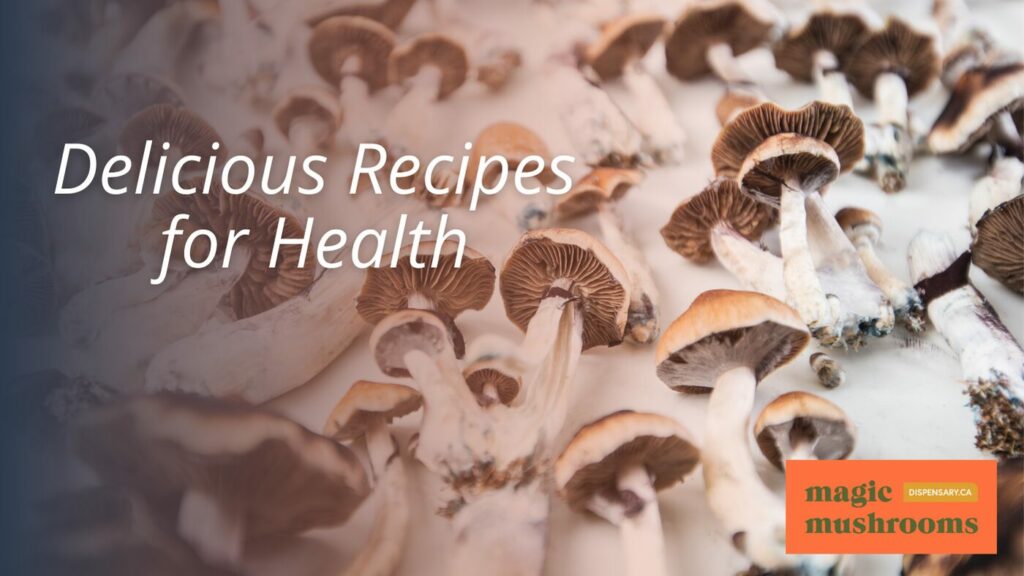
Incorporating vitamin C and mushrooms into your culinary repertoire can be a delightful way to enhance your health. The blend of these two ingredients not only packs a nutritional punch but also offers an array of diverse flavors to savor.
One simple yet satisfying recipe is a mushroom and bell pepper stir-fry. High in vitamin C, bell peppers complement the earthy taste of mushrooms, while garlic and onions add a depth of flavor. Start by stir-frying sliced bell peppers and mushrooms in olive oil. Then, add minced garlic and onions and season with salt and pepper. You can serve this vibrant dish as a side or toss it with cooked quinoa for a wholesome meal.
For a heartier option, consider a mushroom and citrus salad. Toss together raw, sliced mushrooms, like shiitake and cremini, with segments of vitamin C-rich citrus fruits such as oranges or grapefruits. Add fresh herbs, like parsley or mint, and a simple vinaigrette made from olive oil, lemon juice, and a touch of honey. The result is a refreshing salad that marries the meatiness of mushrooms with the tang of citrus, providing a nutrient-dense meal that is as pleasing to the palate as it is beneficial to your health.
These recipes are just a starting point. Combining vitamin C and mushrooms offers endless culinary possibilities and promises an enjoyable journey toward improved health.
Supplement Options: What to Look For
While incorporating vitamin C and mushrooms into your diet through food is beneficial, you might also consider supplementing these nutrients for additional health benefits. Supplements can provide a concentrated dose of these nutrients, potentially boosting your health and wellness regimen. However, not all supplements are created equal. Here’s what you should look for when selecting vitamin C and mushroom supplements.
Firstly, always check the ingredient list. For vitamin C supplements, the ingredient should be ascorbic acid or a variant thereof. It’s also advisable to choose a supplement with bioflavonoids, which enhance vitamin C absorption. For mushroom supplements, look for products containing the full spectrum of mushroom mycelium and fruiting bodies. This guarantees you’re receiving the broadest range of beneficial compounds.
Secondly, consider the dosage. The recommended daily allowance for vitamin C is 75mg for women and 90mg for men. For mushrooms, there’s no established daily dose, but most supplements suggest about 1-2 grams per day. However, always consult a healthcare professional before starting any new supplement regimen.
Next, look for third-party testing. This ensures that the supplement contains what it claims and is free of contaminants. Reputable companies will have their products tested by independent laboratories and will make these results available to consumers.
Lastly, consider the brand’s reputation. Companies with a long-standing, positive reputation are more likely to produce high-quality, reliable supplements. Reading reviews and doing some research can help you ensure that you choose a safe and effective supplement.
The Role of Lifestyle Changes
Beyond supplementation’s benefits, lifestyle changes can significantly enhance the impact of vitamin C and mushrooms on your health. A balanced diet, regular exercise, adequate sleep, and stress management are essential in maximizing the effectiveness of these natural remedies.
A balanced diet, rich in fruits, vegetables, lean proteins, and healthy fats, guarantees that your body gets a wide range of nutrients, including vitamin C. Mushrooms, too, can be incorporated into your meals in various ways. However, supplementation becomes necessary if your diet lacks variety or you cannot consume certain foods due to dietary restrictions.
Exercise is another critical component of a healthy lifestyle. Regular physical activity improves circulation, enhancing the absorption and distribution of nutrients throughout the body. This means your body can utilize the vitamin C and mushrooms you consume more effectively.
Adequate sleep is crucial for overall health and wellness. During sleep, the body repairs and regenerates cells, a process that vitamin C aids. Mushrooms, on the other hand, contain certain compounds that promote sleep and relaxation.
Lastly, stress management is essential. Chronic stress can deplete your body’s vitamin C stores and negatively affect your immune system. Techniques like mindfulness, meditation, and yoga can help manage stress levels, allowing your body to utilize vitamin C and the therapeutic compounds in mushrooms more effectively.
Real-Life Success Stories

Drawing from the experiences of individuals who have successfully improved their health by combining vitamin C and mushrooms provides powerful illustrations of the potential benefits. One such example is 35-year-old software engineer James, who suffers from chronic fatigue. After incorporating a daily regimen of vitamin C and mushroom supplements, he reported increased energy levels and cognitive function within weeks.
Similarly, Sarah, a 52-year-old teacher, turned to this unique combination to combat her recurring bouts of cold and flu. After a few months of daily intake, she noticed a significant decrease in the frequency and severity of her symptoms, attributing her improved immunity to the synergistic effects of vitamin C and mushrooms.
In another instance, 60-year-old Mark, a retired veteran, battled with high blood pressure for years. Incorporating vitamin C and mushroom supplements into his diet showed a noticeable reduction in his blood pressure levels. His doctor affirmed that the supplements, a balanced diet, and regular exercise had played a key role in his improved health status.
These stories highlight the transformative potential of combining vitamin C and mushrooms for overall health and wellbeing. However, it is essential to remember that these results may vary individually due to age, health conditions, and lifestyle factors. As always, it is advisable to consult with a healthcare professional before starting any new dietary supplement regimen.
Monitoring Your Progress
Consistent and diligent monitoring of your body’s response is crucial to gauge the impact of combining vitamin C and mushrooms on your health. This process involves observing changes in physical health, mental wellness, and overall vitality. The key is to be attentive to subtle and significant wellbeing shifts.
By following this regimen, you should document your current health status. This can include noting your energy levels, immunity strength, cognitive function, and health issues. A thorough baseline report will help you make a detailed analysis later.
Once you start incorporating vitamin C and mushrooms into your diet, keep a daily journal to record your observations and experiences. This can include changes in your sleep patterns, digestion, mood, and energy levels. You should also note any improvements in immunity, such as a reduced frequency of common illnesses like colds and flu.
In addition to your observations, regular health check-ups can provide objective data on the effects of this regimen on your health. Blood tests and other medical examinations can reveal changes in your nutrient levels, immune function, and overall health status. Sharing your dietary changes with your healthcare provider to ensure proper assessment is essential.
Potential Side Effects
While combining vitamin C and mushrooms can offer numerous health benefits, it is equally essential to be aware of potential side effects. Like all supplements, the intake of vitamin C and mushrooms, particularly psychedelic mushrooms or ‘shrooms,’ should be approached with caution and under the guidance of a healthcare professional.
Excessive vitamin C intake can cause gastrointestinal problems such as nausea, diarrhea, and stomach cramps. It can also lead to kidney stones, especially in individuals with a history of the condition. Vitamin C is also known to interfere with certain medications, including chemotherapy drugs, statins, and blood thinners, which may lead to adverse effects.
On the other hand, the consumption of ‘shrooms’ also carries several risks. Psychedelic mushrooms contain the active compound psilocybin, which can induce hallucinations, changes in perception, and psychological distress. In the short term, users may experience panic attacks, paranoia, and disorientation. Long-term effects are less understood but may include persistent psychosis and hallucinogen persisting perception disorder (HPPD), characterized by flashbacks to hallucinations long after taking the drug.
Additionally, combining these substances may amplify their effects. For example, vitamin C is believed to enhance the effects of psilocybin, which could potentially increase the risk of adverse psychological reactions.
The Future of Health: Vitamin C and Shrooms
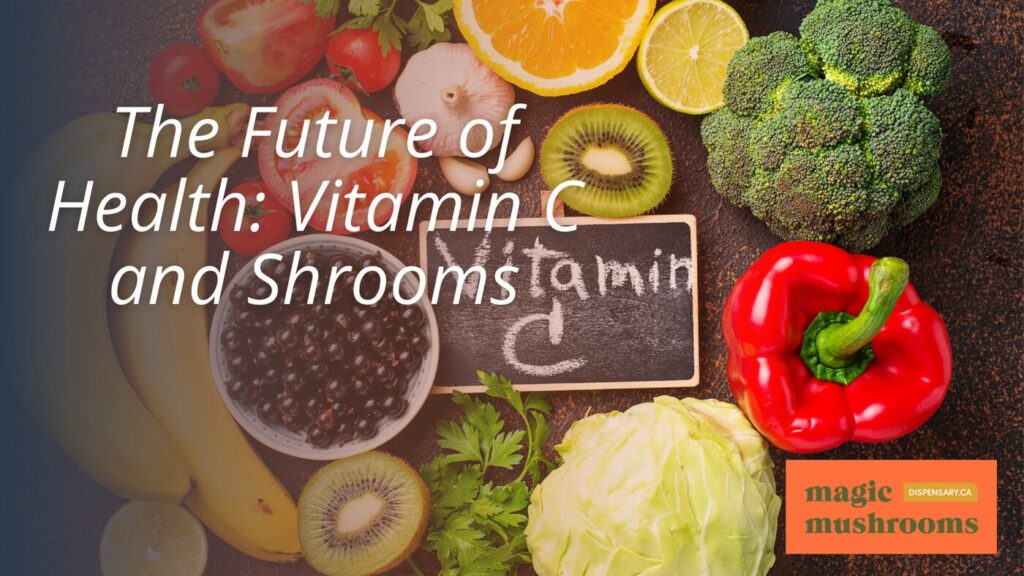
Despite the potential risks associated with combining vitamin C and shrooms, researchers are exploring this intriguing partnership’s potential positive implications for future health treatments. Although the concept of amalgamating these two substances is not new, recent studies are beginning to shed light on the complexities of their interaction and how they could revolutionize conventional health therapies.
Shrooms, or psilocybin mushrooms, have been used for centuries in traditional medicine. They are currently being researched for their potential to treat a range of mental health conditions, including depression, anxiety, and post-traumatic stress disorder. Combining shrooms with vitamin C, a potent antioxidant, could enhance their therapeutic effects. This is based on the hypothesis that vitamin C could increase the bioavailability of psilocybin, thereby enhancing its absorption and efficacy.
Moreover, vitamin C has been shown to reduce the harmful effects of oxidative stress in the body, which could potentially work synergistically with the antidepressant effects of shrooms. This combination could provide a robust, natural approach to managing various health conditions in the future.
There’s still much to learn about this potential therapeutic duo. However, early research has shown promising results, sparking enthusiasm among scientists and healthcare providers. Rigorous future studies will be essential to validate these findings, determine safe dosage levels, and understand the full scope of potential side effects.
The combination of Vitamin C and shrooms could influence the future of health. With continued research and a balanced, science-based approach to their use, this intriguing duo may transform how we approach health and wellness.
Frequently Asked Questions
Can I Consume Vitamin C and Shrooms if I’m Pregnant or Breastfeeding?
As the saying goes, ‘Better safe than sorry’. If you are pregnant or breastfeeding, it’s essential to consult with your healthcare provider before introducing any new supplements or foods into your diet. While Vitamin C is generally safe, the effects of consuming shrooms during pregnancy or lactation are poorly researched. Therefore, it’s best to err on caution to guarantee your and your baby’s health.
Are There Any Known Interactions Between Vitamin C, Shrooms, and Prescription Medications?
Interactions between Vitamin C, shrooms, and prescription medications depend on the type of medication involved. Certain drugs may interact negatively with Vitamin C or shrooms, potentially altering the effectiveness of the medication or causing adverse effects. Therefore, consulting with a healthcare provider before combining these substances with any prescription medication is crucial. This helps in individual safety and achieving desired therapeutic outcomes without unexpected complications.
Are There Specific Medical Conditions That May Worsen With the Consumption of This Combination?
Notably, individuals with a history of kidney disorders should exercise caution, as excessive Vitamin C intake could potentially lead to kidney stones. Similarly, consumption of mushrooms, particularly psychedelic ones, may heighten symptoms in individuals with psychiatric disorders. It is always prudent to consult a healthcare professional before introducing new elements into your diet regimen.
Can Children Take Vitamin C and Shrooms for Overall Health Enhancement?
Given that Vitamin C is generally safe for children in recommended doses, the use of ‘shrooms’ or medicinal mushrooms should be cautiously approached. Certain types can offer health benefits; however, their effects on children are not well-researched. It is advisable to consult with a healthcare professional before introducing new supplements, including Vitamin C and mushrooms, into a child’s diet for health enhancement.
How Long Does It Usually Take to See Noticeable Health Improvements With This Regimen?
Like the dawning of a new day, health improvements can take some time to become noticeable. Individual responses can vary greatly when adopting a regimen combining Vitamin C and shrooms. Two to three weeks of consistent intake may be needed to discern noticeable changes. Seeking guidance from a healthcare professional for personalized advice is crucial and ensuring the regimen is safe and effective for your unique health circumstances.
Conclusion
The amalgamation of Vitamin C and medicinal mushrooms represents a potentially transformative approach to holistic health underpinned by scientific research. This combination, while promising, requires careful monitoring and consideration of potential side effects. As the future of health pivots towards natural, synergistic compounds, the pairing of Vitamin C and mushrooms may emerge as a potent, health-boosting duo, revolutionizing overall well-being and fortifying the well-being of natural defenses.
Buying Microdosing Mushrooms Online in Canada
Are you an avid microdoser or looking to venture into the art of microdosing? Working with a reliable, trustworthy shrooms dispensary is paramount in becoming a better version of yourself. Magic Mushroom Dispensary prides itself on its comprehensive collection of top-notch microdosing products, psilocybin books, excellent customer service, and fast, discreet shipping. Visit our online shop today and enjoy low prices and free shipping for orders above $99.
Originally posted on May 17, 2024 @ 6:05 am
